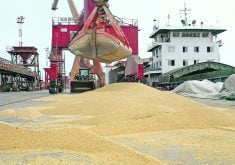Agricore United delegates have decisively voted to stay out of the debate over the Canadian Wheat Board’s monopoly.
By a vote of 90 to 33, farmer-delegates approved a resolution calling on AU to remain neutral in the CWB debate.
The result was a triumph for delegates who saw the issue as a threat to AU’s core business of grain handling and selling crop supplies.
“There are different philosophies out there in the prairie provinces that could, if we took one side or the other, affect our volume of business,” said Bernie von Tettenborn, a Camrose, Alta., farmer who moved the resolution.
Read Also

Defence investments could benefit agriculture
A bump in Canada’s NATO spending commitments could lead to infrastructure investments that would benefit rural areas
“I believe we’d be better off if we stay outside that conflict.”
Some other farmers strongly supported von Tettenborn’s argument.
The wheat board issue “has the potential to be very divisive,” said Henry Barbier, a Saskatchewan farmer from the Reed Lake area.
He said farmers had recently voted in CWB elections and AU should not ignore that fact.
Barbier said Saskatchewan Wheat Pool was an example of a company that didn’t listen to its members and suffered because of it.
“Let us learn from others’ mistakes and not repeat them,” he said.
William Ridgeway of the South Lakes, Man., district said nothing should distract the company from its commercial activities.
“Our current position is to be the best damned grain company around,” said Ridgeway. “If we keep on that issue of wanting to be the best grain company, we’ll succeed.”
But Albert Wagner of Acheson, Alta., president of the Western Barley Growers Association, said the CWB issue is all about business.
“The monopoly of the Canadian Wheat Board affects our efficiencies, it affects our ability to utilize our assets, and thereby affects our bottom line,” said Wagner.
After the decisive delegates vote, AU president Ted Allen summarized its result as “our position is that we have no position.”
CWB farmer director Bill Nicholson, who observed the vote and the meeting, said he was relieved.
“I think it’s preferable that we operate on a businesslike basis and that’s what delegates asked for and recognized here,” said Nicholson, who pointed to CWB elections as the appropriate place to debate the monopoly issue.















